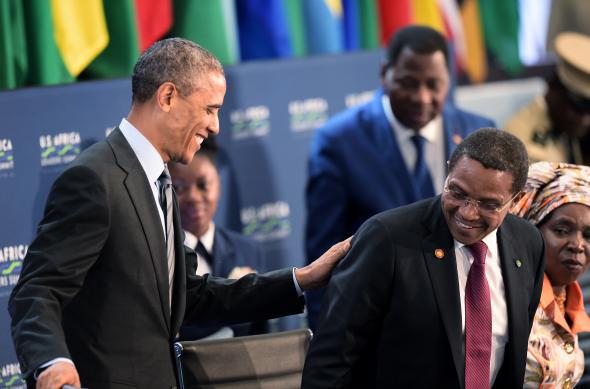Wednesday marked the last day of U.S. efforts to strengthen ties with Africa through the first-ever U.S.-Africa summit, for which nearly 50 African heads of state traveled to Washington, D.C. While the summit seems to have gone smoothly, some have asked an uncomfortable question: Why wasn’t a meeting of 50 Africans and one American president held in Africa?
In March, Kenyan political columnist Mukoma Wa Ngugi compared Barack Obama to a father summoning his children; the White House’s invitation, he said, was an insult and the only way to right this condescension would have been for all the heads of states to boycott the summit and have Obama attend an African Union meeting instead. Ngugi may have been alone in asking that the leaders snub the White House, but he’s not the only one that noticed the dynamic at play. Sudanese-British telecommunications tycoon Mohammed Ibrahim expressed similar sentiments at a U.S.-Africa Business Forum panel:
Everywhere in Africa there are Chinese businesspeople, there are Brazilian businesspeople. None of us went to Brazil, or to Asia or to China to tell them, look, come and invest in Africa. They found out themselves and they come and invest. That’s how basic business people behave. Why do we need to come and inform these misinformed American businesses? You know, you guys invented Google. Use it please.
With countries like China beating the U.S. in the new scramble for African trade (China’s trade with Africa exceeded $200 billion in 2013, more than doubling the America-Africa total) the summit looks like the Obama administration’s crash course in building up relations with a region that—as of last year— was home to 11 of the world’s 20 fastest-growing economies. For now, African leaders apparently decided that the benefit of potential American connections was worth whatever face they lost by traveling to American soil. But as the continent looks to shift its narrative from “Africa needing” to “Africa rising,” maybe more decision-makers will begin to bear Ngugi’s point in mind: “One cannot demand equal trade on bended knee, beggar’s bowl in hand.”
